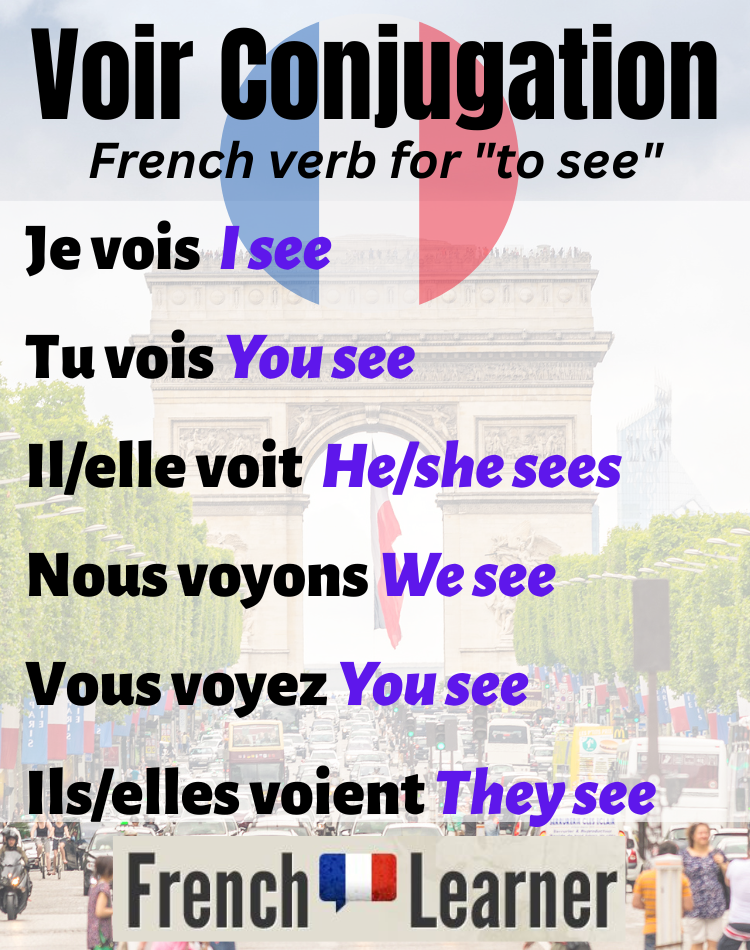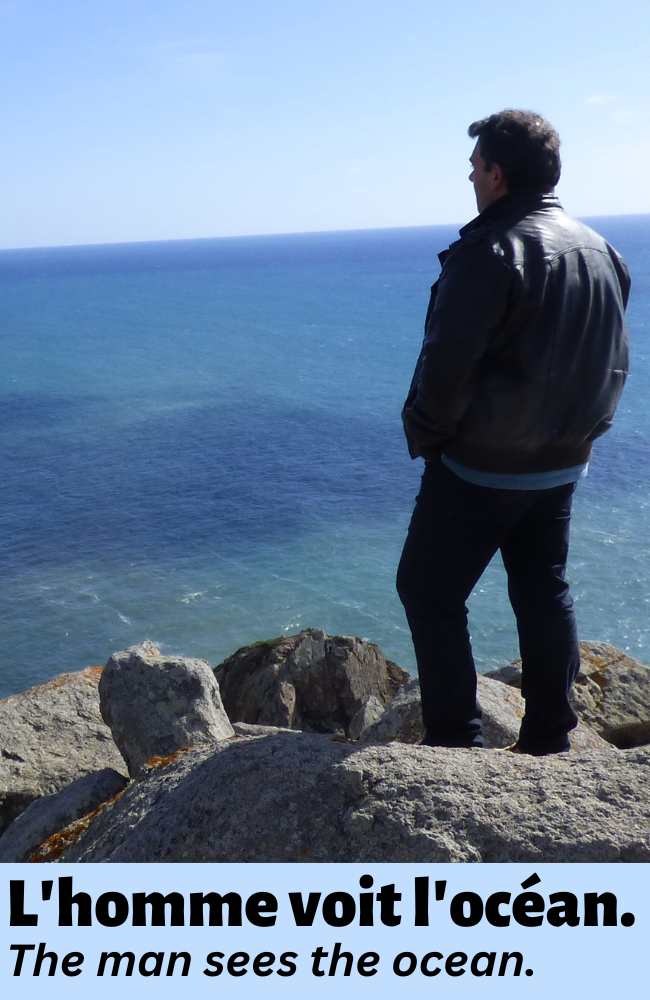The conjugation of voir (Meaning: To see in French; Pronunciation; vwaʀ) is: Je vois (I see), tu vois (you see), il/elle voit (he/she sees), nous voyons (we see), vous voyez (you see) and ils/elles voient (they see). This post will provide conjugation charts for voir in six major tense with example sentences.

Voir is an irregular French -ir verb. This means that its endings in the present tense are different to other regular verbs in the -ir group, such as finir (to finish).
The past participle is voir is vu (saw). We’ll elaborate more on this below in the passé composé section.
We’ve covered the following six major tenses on this page:
- Le present (present tense)
- Le passe compose (compound past)
- L’imparfait (imperfect)
- Le futur simple (simple future)
- Le conditionnel (conditional)
- Le subjoncdtif (subjunctive)
Voir conjugation table
Before getting into the charts with example sentences we’ll first take a quick look the conjugation table of voir.

Voir conjugation charts
Present tense (present indicative)
In the present tense (le présent), je vois translates to both “I see” and “I am seeing”.
| Je vois | I see | Je vois le chien. | I see the dog. |
| Tu vois | You see (familiar, singular) | Tu vois le chat. | You see that cat. |
| Il/elle voit | He/she sees | Elle voit les montagnes. | She sees the mountains. |
| Nous voyons | We see | Nous voyons la voiture. | We see the car. |
| Vous voyez | You see (formal, plural) | Vous voyez la plage. | You see the beach. |
| Ils/elles voient | They see | Ils voient leurs amis. | They see their friends. |
Compound past (passé composé)
The passe composé is a frequently used French past tense to describe actions which occurred a specific point in time. J’ai vu translates to “I saw”.
| J'ai vu | I saw | J'ai vu le film. | I saw the movie. |
| Tu as vu | You saw (familiar, singular) | J'ai vu le prof dans la salle de classe. | I saw the teacher in the classroom. |
| Il/elle a vu | He/she saw | Elle a vu un bon ami. | She saw a good freind. |
| Nous avons vu | We saw | Nous avons vu l'étoile. | We saw the star. |
| Vous avez vu | You saw (formal, plural) | Vous avez vu ma femme. | You saw my wife. |
| Ils/elles ont vu | They saw | Ils ont vu un oiseau. | They saw a bird. |
Imperfect indicative (imparfait)
The imparfait (imperfect) is another commonly used French past tense used to describe actions which occurred at unspecified points in time. Je voyais translates to “I used to see” and “I was seeing”.
The verb voir conjugated in the imperfect tense in French does not lend itself very well to sample sentences. Hence, we’ve just included the conjugation and English equivalents below.
| Je voyais | I used to see, was seeing |
| Tu voyais | You used to see, were seeing (familiar, singular) |
| Il/elle voyait | He/she used to see, was seeing |
| Nous voyons | We used to see, were seeing |
| Vous voyez | You used to see, were seeing (formal, plural) |
| Ils/elles voyaient | They used to see, were seeing |

Simple future (futur simple)
The futur simple tense is used to express events which will occur in the future. Voir has an irregular stem in the future simple: -verr. Je verrai translates to “I will see”.
Interestingly when using with the third-person singular pronoun on, meaning “one” or “we”, on verra translates to “we’ll see” as in “we’ll see what happens”.
| Je verrai | I will see | Je verrai mes amis. | I will see my friends. |
| Tu verras | You will see (familiar, singular) | Tu verras les résutats. | You will see the results. |
| Il/elle verra | He/she will see | Elle verra le lever du soleil. | She will see the sunrise. |
| Nous verrons | We will see | Nous verrons plus tard. | We will see later. |
| Vous verrez | You will see (formal, plural) | Vous verrez une tempête de neige. | You will see a snow storm. |
| Ils/elles verront | They will see | Ils verront de bonnes conditions de ski. | They will see good ski conditions. |
Conditional mood (présent du conditionnel)
In French, le conditionnel is used to express hypothetical events which “would” occur. Je verrais translates to “I would see”.
| Je verrais | I would see | Je verrais le spectacle si javais un billet. | I would see the show if I had a ticket. |
| Tu verrais | You would see (familiar, singular) | Tu verrais ton ami si tu avais le temps. | You'd see your friend if you had time. |
| Il/elle verrait | He/she would see | Elle verrait ses amis si elle avait une voiture. | She would see her friends if she had a car. |
| Nous verrions | We would see | Nous verrions nos amis si nous avions le temps libre. | We'd see our friends if we had free time. |
| Vous verriez | You would see (formal, plural) | Vous verriez le film si le cinéma était ouvert. | You'd see the movie if the cinema was open. |
| Ils/elles verraient | They would see | Ils verraient l'émission s'ils avaient une télévision. | They'd see the show if they had a TV. |
Present subjunctive (subjonctif)
The French use the subjunctive mood to express wishes, emotions and doubts. Que je vois translates to “that I see”.
| Que je voie | that I see | Il faut que je voie ce film. | I need to see this film. |
| Que tu voies | that you see (familiar, singular) | Je veux que tu voies sa réaction. | I want you to see see his reaction. |
| Qu'il/elle voie | that he/she sees | Je doute qu'elle voie la vérité. | I doubt she sees the truth. |
| Que nous voyions | that we see | Il faut que nous voyions les résultats. | We need to see the results. |
| Que vous voyiez | that you see (formal, plural) | Je suis heureux que vous voyiez un changement. | I'm happy you're seeing a change. |
| Qu'ils voient | that they see | Il faut qu'ils voient si c'est possible. | They have to see if it's possible. |

Voir – Summary video
In the following video online teacher, Alexa, summarizes the conjugations for voir in the present, past and future tenses and provides lots of example sentences.


